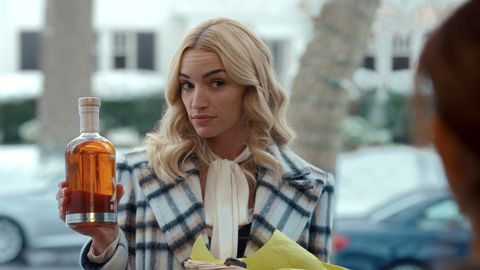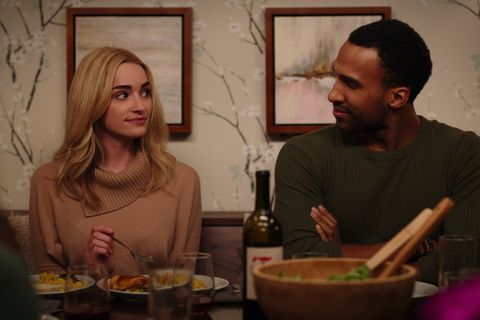Ginny and Georgia spoilers follow.
Note: The following article contains discussion of themes including self-harm.
Ginny and Georgia has always been progressive in its storytelling. The teen dramedy pushes the boundaries when it comes to conversation surrounding race (including the exploration of mixed-race identity) and sexual experimentation. It’s also deft at embracing queerness and gay relationships in an authentic way that feels commonplace.
Where the Netflix series let itself down in the past, however, was with its content surrounding mental health.
In season 1, it was established early on that Ginny (Antonia Gentry) was using self-harm as an unhealthy way to cope with her overwhelming feelings.
By episode 2, she, not for the first time, burnt herself with a lighter. We later discovered this was her method of dealing with instability in the home as a result of Georgia’s chaotic parenting.
While we applaud Ginny and Georgia‘s attempt to go beyond entertaining us with Georgia’s sensational antics by showing the ramifications of her behaviour, Ginny’s trauma was little more than a footnote, swept under the narrative rug in, a ‘kids do the darndest things’ manner.
Maybe the creators weren’t that flippant about it, but they didn’t take the time to explore Ginny’s mental health in much depth. Self-harming was just something she did — a very big deal but secondary to the story at hand.
This was a mistake. Any time self-harm or mental health crops up in a show, central to the story or not, it should be addressed adequately.
The creators owe it to those viewers who may be suffering to not only handle the act with care (which they do), but also leave room to explore the feelings and thought process that surround it.
Throughout much of season 1, Ginny’s self-harm remains a secret act until the final arc of the season, when Marcus Dawson’s Creek-s his way into her bedroom and catches her, lighter to thigh.
This leads to a blow-up between the two, which results in Marcus’ near-fatal accident.
The issue of her self-harm therefore becomes the vehicle to move Ginny and Marcus’ love story further along, breaking them apart before mending them.
The two do reconcile, and Marcus (Felix Mallard) confides in Ginny about his own struggles with depression after the loss of his friend. He then encourages her to lean on him.
It is a beautiful moment, one that allows Ginny to open up about her anguish, but it’s just a pocket in what should have been a much larger conversation threaded throughout.
Fast forward to Ginny and Georgia season 2, and the creators made up for this tenfold by giving the delicate topic of mental health struggles the attention it deserves.
“Everyone’s fighting a battle you can’t see,” showrunner Debra J Fisher said during an interview with Variety. “It’s really hard to [be a] human overall, which I think really translates into a lot of our arcs this season.”
While Ginny’s struggles with mental health have been pushed to the forefront of the season, this decision hasn’t necessarily been well-received.
In fact, there has been a bit of a Ginny backlash on Twitter, with fans of the show struggling to digest Ginny’s volatile behaviour towards Georgia (Brianne Howey).
This content is imported from Twitter. You may be able to find the same content in another format, or you may be able to find more information, at their web site.
However, no matter how much we root for Georgia (and we do), Ginny’s extreme rebellion makes sense.
Georgia’s aggressively protective nature and lack of boundaries are the root cause of Ginny’s trauma, and those feelings are spewing out like acid. However, instead of depicting just the fallout of her emotional turmoil, the show digs deep, unearthing her issues during her therapy session with doctor Lily.
Firstly, Ginny and Georgia‘s decision to move away from the damaging ideology that ‘Black people don’t need therapy’ is the kind of representation we need. In fact, Zion (Nathan Mitchell), Georgia’s Black father, is the one who puts the suggestion to her, while Georgia is the one to sniff at it.
The importance of his proactive and encouraging attitude towards getting professional help reinforces the idea that seeking therapy is not shameful or indicative of weakness.
“We always wanted to have Zion be much more a part of the conversation. We didn’t want to fall into a trope of him being a bad dad. We also wanted Ginny to get into therapy,” Fisher told Variety.
“And those were really important to [psychologist] Dr Taji [Huang, whom they consulted for Ginny and Georgia season 2], as well as us just to show that other parts of mental health with her being supported in that way.”
During Ginny’s therapy sessions, we learn that Georgia’s behaviours triggered her to engage in self-harm. And though Ginny’s healing process involves a lot of lashing out, it also allows room for exactly that: healing. The Thelma and Louise-like mother-daughter duo learn to understand one another.
Through Ginny’s boyfriend Marcus, we also see the other side of the mental health spectrum. While Ginny is working to better herself, Marcus sinks into drugs, alcohol, and solitude to cope with his depression.
Ginny and Georgia focuses more intrinsically on his psyche during the episode ‘Hark! Darkness Descends!’ The Marcus-centric episode details what it’s like to suffer from depression, but does so in a very Marcus way.
From his explanation of depression being a slow and creeping progression to the fake smiles barely masking its presence (until they no longer mask it), the episode is deeply poetic, darkly beautiful, and haunting.
Heaviness is in his voice, he lacks energy to even talk, and each word he speaks is weighted, giving us a glimpse at what it’s like to experience depression.
Marcus may not be fully ready to receive the help he needs, and Ginny and Georgia doesn’t always have to provide a solution for their characters. That’s not life.
However, what season 2 does do effectively is give insight into the pain of someone struggling with mental health.
When Marcus tells Ginny he doesn’t have room for anyone else’s pain, it strikes a chord, one that may resonate with those whose loved ones are experiencing mental health struggles. This sentiment isn’t a rejection of a person, as Ginny initially feels, and Ginny’s eventual acceptance of this fact shows growth.
She is used to Marcus shouldering her pain, but now she must show up for him — not in the way she wants to, but the way he needs her to be.
Seeing someone she loves in pain triggers Ginny to seek a solution, but she learns that Marcus doesn’t need her to fix him. Sometimes, it’s necessary to start with just being there for your loved one, and that can be as simple as giving them a hug.
Fisher admits that she always had a long-term goal when it came to how Ginny and Georgia handled depicting mental health among teens.
“It was always about the long game, and just being able to approach mental health, self-harm, and depression in a really realistic, grounded way that we hope really resonates with the kids,” she said.
In this regard, Fisher and her creative team have succeeded with season 2, balancing the needs of the overall story while justly leaving scope to explore mental health.
Ginny and Georgia seasons 1 and 2 are available to watch on Netflix.
If you’ve been affected by the issues raised in this story, organisations who can offer support include Samaritans on 116 123 (www.samaritans.org) or Mind on 0300 123 3393 (www.mind.org.uk). Readers in the US are encouraged to visit mentalhealth.gov.














